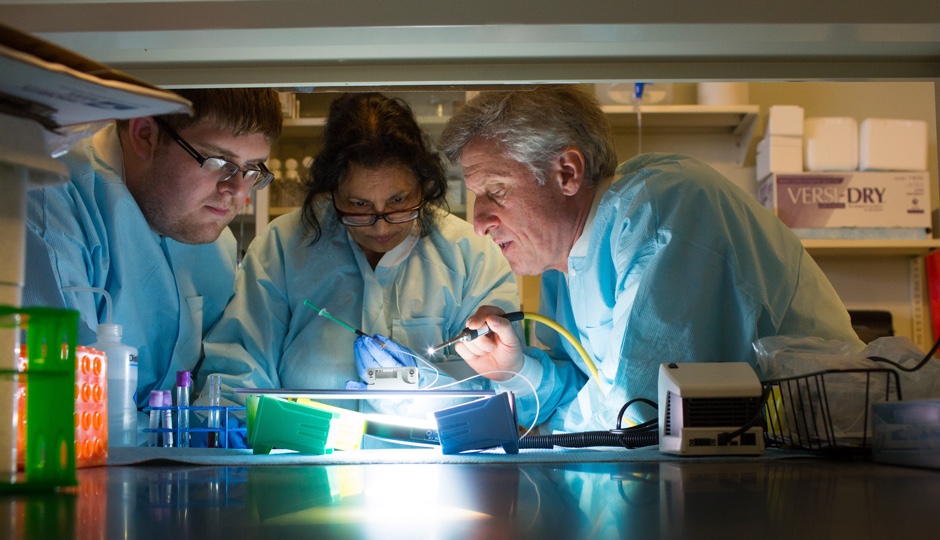Philly Now a Top 5 City for Life Sciences, Study Says
Deemed a breakthrough life sciences hub in a new JLL report, the city climbed two spots this year due to strong performance in its “eds and meds” sector.

Photo courtesy of University City Science Center
Professional services and research firm JLL recently released its annual Life Sciences Outlook report, which scores 15 metropolitan areas across the country and Canada on life sciences workforce statistics, funding availability, and other factors.
The report reinforces the idea that Philadelphia’s life sciences industry is thriving. The city came in at #5 on the list, up two spots from last year’s #7 rank. Continued lab space expansion and $900 million in 2016 NIH funding helped Philadelphia overtake the DC metropolitan area and Seattle-Bellevue. Greater Boston, the San Francisco Bay area, San Diego and Raleigh-Durham took the top four spots.
And with the rise in rank, Philadelphia’s life sciences sector shows no signs of slowing due to three key trends: more students are getting degrees in the region, more millennials are moving in to meet talent needs, and the city’s ecosystem of established pharma firms and new startups is being cultivated by growing research institutions.
Between 2010 and 2015, the Bachelor’s degree-holding population in Philly grew by 30 percent, more than any of the 10 largest U.S. cities and early 400,000 students attend one of the region’s 90 plus colleges or universities, with this population feeding into the region’s “eds and meds” space. As of 2015, 567,000 people in the Philadelphia metropolitan area worked in “eds and meds.”
Philadelphia has also added more than 135,000 millennials over the last decade, a trend that creates an attractive talent pipeline for life sciences firms seeking a talented workforce, the report says.
Researchers nodded to some recent developments out of the region’s top “eds and meds” establishments:
Eds and meds institutions are proactive partners in the life sciences economy. Drexel University if proposing 1 million square feet of rentable lab space at its Schuylkill Yards innovation district, a partnership with Brandywine Realty Trust. Children’s Hospital of Philadelphia and others leverage the Science Center to nurture and monetize research begun in-house. Spark Therapeutics, a CHOP success story, is keeping headquarters in University City and is exploring sites for its lab and manufacturing space.
The industry’s impact on real estate is also telling of how much the sector has grown and will continue to grow.
The Philadelphia market boasts more than 11 million square feet of life sciences real estate and 98 percent of its lab space occupied, “given that many established Philadelphia companies opt to pursue long-term leases or build-to-suit opportunities in single occupant buildings.” Philadelphia’s single-digit vacancy rate in physical space for the life sciences means that new development must keep up to meet the industry’s demand. And they’ll have to cater to millennial interests, according to the study, with amenity-rich spaces that foster “a collaborative environment” and “promote a communal atmosphere that goes beyond your standard 9-5 campus.”
About 17 percent of the city’s lab inventory currently exists across University City and the Navy Yard. In the suburbs, the Route 202 corridor from Exton to King of Prussia is home to 37 percent of the region’s lab space. Montgomery County is the region’s largest submarket on a square-footage basis, mostly because of Merck & Company’s 3.6 million square-feet occupancy. Suburban demand for lab space will continue to be driven by growing pharmaceutical firms like Trevena, which recently relocated and expanded its footprint, the report says.
While more life sciences and tech companies are calling Philadelphia home and industry leaders are investing heavily in initiatives like Pennovation Works, DreamIt Health Ventures and a new Health Care Innovation Collaborative, growing local access to sources of venture capital remains a priority. VC funding for life sciences stood at $389 million for the year, compared to Greater Boston’s $3 billion in VC funding for life sciences.


